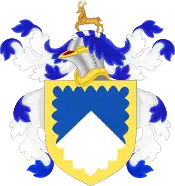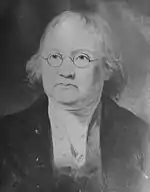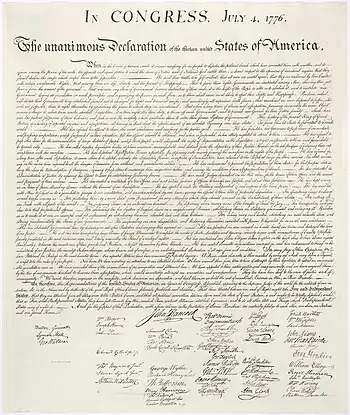William Ellery | |
|---|---|
.jpg.webp) Engraving of Ellery by Henry Bryan Hall | |
| 23rd Chief Justice of the Rhode Island Supreme Court | |
| In office June 1785 – May 1786 | |
| Preceded by | Paul Mumford |
| Succeeded by | Paul Mumford |
| Personal details | |
| Born | December 22, 1727 Newport, Colony of Rhode Island and Providence Plantations |
| Died | February 15, 1820 (aged 92) Newport, Rhode Island |
| Resting place | Common Burying Ground, Newport |
| Occupation | Lawyer |
| Known for | signer of the United States Declaration of Independence |
| Signature | |
William Ellery (December 22, 1727 – February 15, 1820)[1] was a Founding Father of the United States, one of the 56 signers of the United States Declaration of Independence,[2][3] and a signer of the Articles of Confederation as a representative of Rhode Island.[4]
In 1764, the Baptists consulted with Ellery and Congregationalist Reverend Ezra Stiles on writing a charter for the college that became Brown University. Ellery and Stiles attempted to give control of the college to the Congregationalists, but the Baptists withdrew the petition until it was rewritten to assure Baptist control. Neither Ellery nor Stiles accepted appointment to the reserved Congregationalist seats on the board of trustees.[5]
Biography
Ellery was born in Newport, Rhode Island on December 22, 1727,[2] the second son of William Ellery, Sr. and Elizabeth Almy, a descendant of Thomas Cornell. He received his early education from his father, a merchant and Harvard College graduate. He graduated from Harvard College in 1747, where he excelled in Greek and Latin. He then returned to Newport where he worked first as a merchant, next as a customs collector, and then as clerk of the Rhode Island General Assembly. He started practicing law in 1770 at age 43 and became active in the Rhode Island Sons of Liberty.
Statesman Samuel Ward died in 1776, and Ellery replaced him in the Continental Congress. He was a signer of the Articles of Confederation and one of the 56 signers of the Declaration of Independence in 1776. The size of his signature on the Declaration is second only to John Hancock's famous signature.
Ellery also served as an associate justice of the Supreme Court of Rhode Island from May 1780 to May 1781, and chief justice from June 1785 to May 1786.[6] He had become an abolitionist by 1785. He was the first customs collector of the port of Newport under the Constitution, serving there until his death, and he worshipped at the Second Congregational Church of Newport.[7][8]
Ellery died on February 15, 1820, at age 92 and was buried in Common Burial Ground in Newport.[9] The Rhode Island Society of the Sons of the Revolution and the William Ellery Chapter of the Daughters of the American Revolution make an annual commemoration at his grave on Independence Day.
Family and legacy

Ellery married Ann Remington of Cambridge, Massachusetts, in 1750. She was the daughter of Judge Jonathan Remington. She died in 1764 in Cambridge and was buried there, and he married Abigail Cary in 1767. He had 19 children, and his descendants include Ellery Channing, Washington Allston, William Ellery Channing, Richard Henry Dana, Sr., Edie Sedgwick, Paulita Sedgwick, Kyra Sedgwick and Andra Akers.[10] Francis Dana married his daughter Elizabeth. His great-great-grandnephew, Major Elbert Ellery Anderson (1833-1903), took his middle name from him.[11]
Ellery left a humorous record of his travels (on a mount he refers to as "my Jenny") from Massachusetts to Philadelphia in 1778 and 1779 that was published in serial form in the Pennsylvania Magazine of History and Biography of the Historical Society of Pennsylvania (1887).[12]
William Ellery is the namesake of the town of Ellery, New York,[13] and Ellery Avenue in Middletown, Rhode Island, is named in his honor
Images
 Ellery's tomb at Common Burying Ground and Island Cemetery in Newport
Ellery's tomb at Common Burying Ground and Island Cemetery in Newport William Ellery's grave inscription
William Ellery's grave inscription Site of Ellery's house in Newport on Thames Street near his burial site
Site of Ellery's house in Newport on Thames Street near his burial site William Ellery by Ole Erekson, engraver
William Ellery by Ole Erekson, engraver
 William Ellery
William Ellery![William Ellery daughter Lucy [Ellery] Channing](../I/Lucy_Ellery_Channing_by_Washington_Allston.jpg.webp) William Ellery daughter Lucy [Ellery] Channing
William Ellery daughter Lucy [Ellery] Channing William Ellery grandson William Ellery Channing
William Ellery grandson William Ellery Channing
See also
References
- ↑ "William Ellery".
- 1 2 Chisholm, Hugh, ed. (1911). . Encyclopædia Britannica. Vol. 9 (11th ed.). Cambridge University Press. p. 290.
- ↑ Bernstein, Richard B. (2011) [2009]. "Appendix: The Founding Fathers: A Partial List". The Founding Fathers Reconsidered. New York: Oxford University Press. ISBN 978-0199832576.
- ↑ "The Signers". harvard.edu. Declaration Resources Project, Harvard University. Retrieved February 9, 2023.
- ↑ Historical Catelogue of Brown University,Providence: Brown University, 1914.
- ↑ Manual – the State of Rhode Island and Providence Plantations (1891), p. 208-13.
- ↑ Adams, John (1853). The Works of John Adams, Second President of the United States: With a Life of the Author, Notes and Illustrations. Little, Brown.
- ↑ "Religious Affiliation of the Founding Fathers of the United States of America". Archived from the original on December 8, 2005.
{{cite web}}: CS1 maint: unfit URL (link) - ↑ Charles Augustus Goodrich "Lives of the Signers of the Declaration of Independence," (T. Mather, New York: 1840) p. 153
- ↑ "Andra Akers Obituary – Los Angeles, CA | Los Angeles Times". Legacy.com. Retrieved April 19, 2019.
- ↑ "Elbert Ellery Anderson (1833-1903), Major E. Ellery Anderson, Attorney, of 11 East 38th Street, New York City". Retrieved November 30, 2022.
- ↑ Ellery, William (1778–1779). "Journal of Route and Occurrences in a Journey to Philadelphia from Dighton, Begun Oct. 24th, 1778" (PDF). Internet Archive. Historical Society of Pennsylvania. Retrieved July 7, 2022.
Oct. 24th, 1778. Sat out from Dighton on a Journey to Philadelphia. [...] The black man who I had engaged to attend me on the Journey, fell sick or pretended to be so. I sent an express to Dighton for a boy with whom I had talked about his going, and had refused to take on account of this same black man. The Boy was now unwilling to go. I applied to Genl Sullivan who accommodated me with a Soldier of Jackson's regiment. The black fellow was a married man and alas and lack-a-day, was under petticoat government, and his sovereign wanted to keep him at home to wait upon her. If I had known previously to my engaging him that he had been under this kind of domination, I should have consulted his Domina and procured her consent, before I had depended upon him, and not suffered this sad disappointment. Well-- Let the ambitious say what they please; Women have more to do with the government of this world than they are willing to allow. Oh! Eve, Eve!
- ↑ Gannett, Henry (1905). The Origin of Certain Place Names in the United States. Govt. Print. Off. p. 117.
External links
- United States Congress. "William Ellery (id: E000115)". Biographical Directory of the United States Congress.
- Brown University Charter
